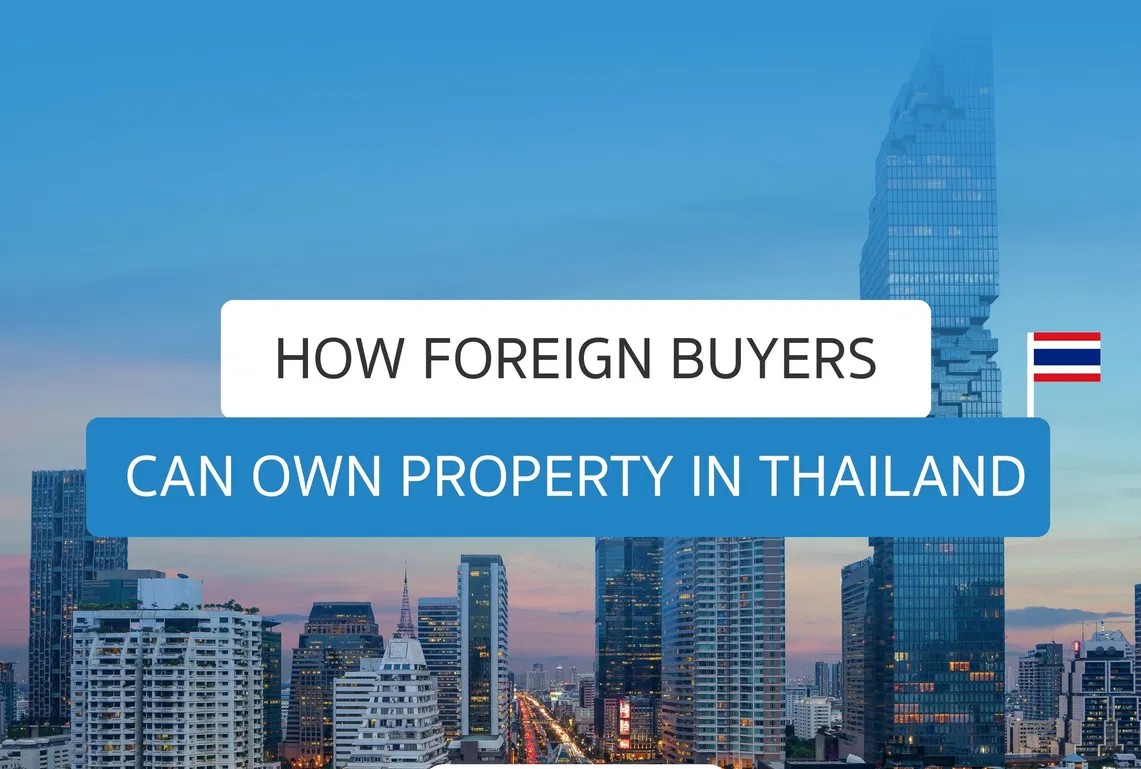
In Thailand, condominiums have two types of ownership:
- Foreign quota – This is where a foreigner owns the unit in their own name. By law, only up to 49% of the total units in a building can be owned this way. It’s the simplest form of ownership — the buyer’s name goes directly on the title deed. It comes usually with a slightly higher purchasing price, due to the limited offer.
- Thai quota – The other 51% of units must be owned by Thai nationals or Thai companies. A foreign buyer can still purchase a Thai quota unit by setting up a Thai company (where they own up to 49% of the shares and have management control). In this case, the unit is owned by the company, and the foreign buyer owns and controls the company.
Main takeaway:
Foreign quota is the most straightforward, but if the quota is already full, buying under a Thai company gives another legal way for a foreigner to own a condo in Thailand. It just comes with extra steps and yearly company maintenance.
Foreign quota is simpler. Thai quota via company gives you more options — especially for the best units that may not be available under the foreign quota.
Here’s a comparison between Foreign Quota Ownership (FQ) and Thai Quota Ownership via Thai Company (TQ)
Who can own
FQ: Foreign individual (in their own personal name)
TQ: Thai-individual or Foreigner through a Thai-registered company (max 49% foreign-owned, at least 51% Thai-owned)
Ownership type
FQ - Foreign freehold – name appears directly on the Chanote (title deed)
TQ - Company freehold – company name on the Chanote; foreigner controls the company
Legal limit
FQ: Max 49% of total saleable area in the condo project
TQ: No quota limit for the company (counts as Thai ownership)
Money transfer requirement
FQ: Funds must be sent from abroad in foreign currency and recorded on a Foreign Exchange Transaction Form
TQ: Paid from the Thai company’s bank account (no foreign currency requirement for registration)
Control of property
FQ: Direct personal ownership
TQ: Indirect control via majority voting rights and directorship in the company
Ongoing obligations
FQ: No corporate maintenance; just standard property taxes and common area fees
TQ: Must maintain the company: annual accounting (Balance sheet)
Transfer process
FQ: Straightforward title transfer at the Land Office to the foreign buyer
TQ: Transfer of the property requires transfer of company shares or direct property sale
Complexity
FQ: Low – simple and fully transparent
TQ: Slightly Higher – requires correct legal structuring to avoid “nominee” issues and stay compliant with Thai law
Typical use case
FQ: Foreigners buying within the 49% quota
TQ: Foreigners who want a unit in the Thai quota (e.g., quota full, or better price)
Here’s a quick pros & cons comparison between Thai Quota (via Thai Company) (TQ) and Foreign Quota (FQ), with information about price and transfer fees
Typical purchase price
FQ: Usually higher (limited supply, higher demand from foreigners)
TQ: Usually lower (larger supply, less competition from foreigners)
Ownership
FQ: Direct, personal freehold under your name
TQ: Indirect, via controlling a Thai company that owns the unit
Transfer fee for resale
FQ: At Land Office: 2% of registered value (plus small admin fees & taxes) for a first buy of a brand new condo / 6.3% in case of a re-sale unit
TQ: If selling the company shares: minimal cost — often just legal fees for share transfer and director change (avoids full property transfer tax)
Ease of buying
FQ: Simple process, well-defined for foreigners
TQ: requires company setup (slightly More complex - need to use the services of an appropriate Lawyer firm - costs approx. 20,000 Thb), or buying an existing company that owns the unit(easy process)
Ongoing costs
FQ: None besides property tax, common fees
TQ: Annual company accounting (~THB 12,000 Thb/year typically)
Liquidity (ease of selling)
FQ: slightly Higher — more buyers can legally own under foreign quota
TQ: slightly Lower — limited to Thai buyers or foreigners willing to use a Thai company structure
Legal security
Very secure under the Condominium Act
Legally secure if structured properly, but must comply with Thai company law (avoid unclear nominee shareholders)
Flexibility
FQ: Limited by the 49% quota
TQ: No quota limit for company ownership in the building
💡 Summary:
- Foreign quota = Higher price, simpler, lower ongoing admin, best legal clarity.
- Thai quota via company = Usually cheaper purchase, possible very low-cost transfer when selling the company (which owns the property - change of Director name) instead of the property, but comes with annual company maintenance and slightly higher complexity— the asset belongs to the company, not the individual directly